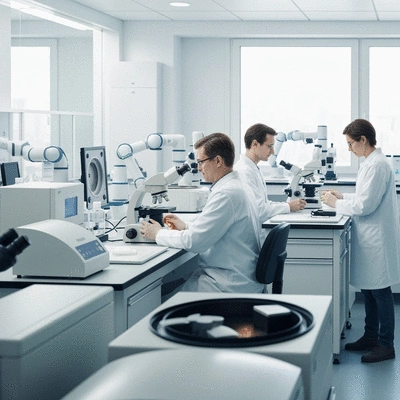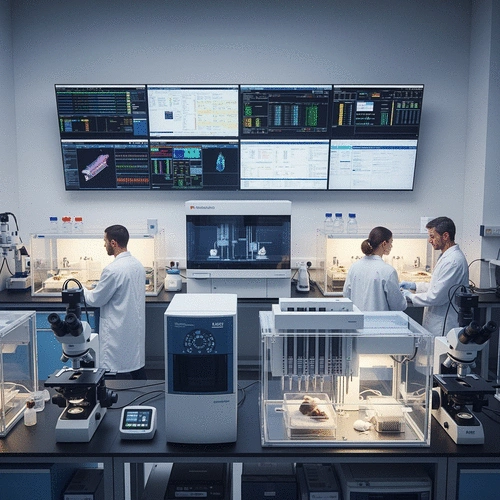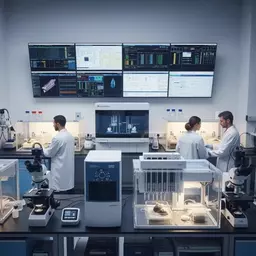In the rapidly changing landscape of veterinary research, how can we ensure that our scientific endeavors align with ethical responsibilities? This article delves into the transformative advancements in animal research labs, highlighting both the importance of innovation and the commitment to animal welfare.
What You Will Learn
- Innovations in animal research drive scientific progress, leading to more accurate and reliable results.
- Ethical considerations are paramount; advances lead to less invasive procedures and alternatives to traditional testing methods.
- Understanding the shift towards non-animal testing methodologies can improve reliability and enhance animal welfare.
- Emerging technologies like organ-on-a-chip and AI-driven models are reshaping animal research, aligning with ethical commitments.
- Staying informed about trends in veterinary medicine and research can empower professionals to make informed decisions for animal welfare.
Innovation and Ethics in Animal Research: A Dual Focus
This visual highlights the key drivers and future trends shaping animal research, emphasizing the critical balance between scientific advancement and ethical considerations.
Key Drivers for Innovation
- ✓ Scientific Progress: More accurate results & breakthroughs
- ✓ Ethical Considerations: Less invasive procedures
- ✓ Regulatory Compliance: Meeting new standards
Ethical Alternatives in Testing
- ✓ In vitro testing methods
- ✓ Computer modeling techniques
- ✓ Human organ-on-a-chip technology
Future Trends & Technologies
- ✓ Increased non-animal testing adoption
- ✓ AI & machine learning for predictive modeling
- ✓ Personalized medicine (organoids)
- ✓ Genomic tools for disease understanding
"Prioritizing Scientific Progress Alongside Ethical Considerations"
- Dr. Elena Hargrove
Understanding the Evolution of Animal Research Labs
As a veterinarian with a decade of experience, I’ve witnessed firsthand the transformative advancements occurring in animal research labs. The evolution of these facilities has been driven by the need for better scientific outcomes, ethical considerations, and evolving regulatory standards. With every innovation, we move one step closer to ensuring that our furry friends and other animals are treated with the respect and care they deserve while also enhancing our understanding of animal health and wellness. For more insights into future developments, explore animal research advances in 2025.
In this section, we'll explore the significance of these advancements, focusing on how they impact scientific research, animal welfare, and the regulatory landscape.

Why Innovations Matter in Animal Research
Innovations in animal research are crucial for several reasons:
- Scientific Progress: New technologies allow for more accurate and reliable results, which can lead to breakthroughs in treatments for both animals and humans.
- Ethical Considerations: Advances lead to less invasive procedures and alternatives to traditional testing methods, ensuring higher welfare standards for animals.
- Regulatory Compliance: As regulations evolve, innovative techniques can help labs meet the new standards without sacrificing quality or ethics.
These advancements are not just about keeping up with regulations; they represent a commitment to better science and greater compassion in the treatment of animals. By prioritizing innovation, we can ensure that our research practices benefit both animal health and scientific integrity.
The transition from traditional animal testing to non-animal methodologies is a significant shift in research practices. This change is driven by growing public concern over animal welfare and the ethical implications of using live subjects in testing. Today, we see a variety of innovative alternatives:
- In vitro testing methods that allow scientists to study cells without the use of live animals.
- Computer modeling techniques that can simulate biological processes.
- Human organ-on-a-chip technology that replicates human physiological responses.
These alternatives not only enhance the ethical landscape of research but also improve the reliability of results. As a community, we must embrace these changes to ensure that the well-being of animals remains a priority in our pursuit of knowledge and innovation. Discover more about how these changes are shaping veterinary medicine trends for 2025.
Breakthrough Technologies Reshaping Animal Research
With the growing emphasis on ethical practices, several breakthrough technologies are emerging that promise to reshape animal research significantly. These innovations not only align with our ethical commitments but also enhance scientific capabilities.
Pro Tip
When considering advancements in animal research, always look for studies that prioritize ethical practices alongside innovative technologies. Engaging with research that incorporates alternatives to animal testing can help you stay informed and make ethical choices in your own practices or pet care routines.
Frequently Asked Questions About Animal Research Innovations
What are the key drivers for innovation in animal research?
Key drivers include the need for scientific progress leading to more accurate results, ethical considerations promoting less invasive procedures, and regulatory compliance to meet new standards without sacrificing quality or ethics.
How are ethical alternatives changing animal testing?
Ethical alternatives involve a shift from traditional animal testing to non-animal methodologies like in vitro testing, computer modeling techniques, and human organ-on-a-chip technology. These innovations improve reliability and enhance animal welfare.
What breakthrough technologies are reshaping animal research?
Breakthrough technologies include increased adoption of non-animal testing methods, advancements in AI and machine learning for predictive modeling, growth of personalized medicine through organoids and ex vivo models, and implementation of genomic tools for disease understanding.
Why is a dual focus on innovation and ethics important in animal research?
A dual focus ensures scientific progress is achieved responsibly. It allows for breakthroughs in animal and human health while upholding strong ethical principles and animal welfare standards, leading to more humane and effective research practices.
What future trends should veterinary professionals watch in animal research?
Professionals should watch for the increasing adoption of non-animal testing methods, advancements in AI and machine learning, the growth of personalized medicine via organoids, and the implementation of genomic tools to enhance disease understanding.
Synthesizing Innovations and Ethical Practices in Animal Research
In the rapidly evolving field of animal research, it’s crucial to synthesize key innovations while maintaining a strong focus on ethics. The advancements we've discussed—from FDA’s NAMs to organ-on-a-chip technologies—highlight a movement towards more humane and effective research practices. By integrating these innovations, we not only enhance our understanding of animal health but also respect the principles of animal welfare and ethical standards.

As we embrace new methodologies, we must remain vigilant about the ethical implications of our research. This dual approach of prioritizing scientific progress alongside ethical considerations is essential for fostering a responsible research environment.
Looking Ahead: The Future of Animal Research Labs
To stay at the forefront of veterinary medicine and animal research, it’s important to keep an eye on emerging technologies and regulatory changes that will shape our future. Here are some trends to watch:
- The increasing adoption of non-animal testing methods
- Advancements in AI and machine learning for predictive modeling
- Growth of personalized medicine through organoids and ex vivo models
- Implementation of genomic tools to enhance our understanding of diseases
Staying informed about these developments can empower both veterinary professionals and researchers to make informed decisions that benefit animal welfare and scientific advancement. For further reading on related topics, consider our article on 2025 pet wellness trends uncovered.
Engaging with the Community: Share Your Thoughts
I invite you, dear readers, to share your insights or experiences regarding the innovations in animal research. Have you encountered any groundbreaking practices in your field, or do you have thoughts on how these changes might impact animal welfare? Your contributions are invaluable as we navigate the future of animal research together!
Let’s foster a vibrant community where we can discuss the implications of these advancements and work collaboratively towards a better understanding of animal health and wellness. What are your thoughts?
Recap of Key Points
Here is a quick recap of the important points discussed in the article:
- Scientific Progress: Innovations lead to more accurate and reliable results, enhancing treatments for both animals and humans.
- Ethical Considerations: Advances promote less invasive procedures, ensuring higher welfare standards for animals.
- Regulatory Compliance: New techniques help labs meet evolving standards without compromising quality or ethics.
- Alternatives to Animal Testing: Embracing in vitro methods, computer modeling, and organ-on-a-chip technologies enhances animal welfare in research.
- Future Trends: Stay informed about non-animal testing methods, AI advancements, and personalized medicine to improve animal health.










